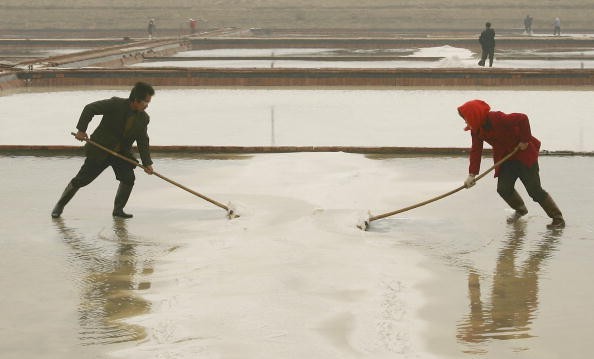China is one step closer to eliminating a government monopoly dating back more than 2,000 years that controlled the price and trade of table salt in markets.
The China salt monopoly has funded to coffers of emperors from the Han Dynasty onward, and helped pay for the construction of the Great Wall.
The Communist party retained the monopoly after taking power in 1949, with courts continuing to punish private salt sellers even in the past decade.
But starting this year, the government will begin rolling out reforms that would see the lowering of salt prices, with state broadcaster CCTV describing it as "policy red envelopes," referring to the money-filled packets traditionally given away during the Lunar New Year.
Under the reforms, producers will be able to sell salt at a price set according to "production costs, product quality and market supply and demand" from the start of 2017, the country's top economic planning agency, the National Development and Reform Commission, announced last year.
The commission warned, however, that officials will be tasked to ensure the "basic stability" of salt prices by establishing reserves, similar to how the government regulates pork prices, which can be tapped into to control inflation.
China's State Council said that salt producers will now be allowed to sell the product directly to markets across the country. Such producers previously sold to state-owned distribution firms, which took most of the share of the industry's profits.
The reforms, which are seen by analysts as a loosening of the government's long-standing iron grip over an essential element of Chinese cuisine, come as market-oriented changes in sectors aimed at curbing the power of state monopolies have ground to a halt.
"Now that salt miners can directly sell to the market, prices will certainly fall. Consumers have more choice about where they can buy their salt from. That's a breakthrough," Zou Jialai, a Shanghai-based lawyer who has represented private salt producers, told the Financial Times.
Zou noted that a huge chunk of China's salt producers are state-owned, with new players finding it nearly impossible to overcome bureaucratic hurdles in order to access the market.
"This opening is an opening towards salt-producing companies, not other companies. It's still essentially a state monopoly," he added.
The reforms are not met without resistance. China's salt regulatory agency, which shares offices with the state-run China National Salt Industry Corp, is said to have opposed the initiative, the Financial Times reported citing insider sources.
The regulator has long maintained a stance that by relaxing the monopoly it would become more difficult to ensure that the salt sold is safe for consumption.
Opponents to China's monopoly over salt have a long history. The Discourses on Salt and Iron, an ancient debate held at the Chinese imperial court in 81 B.C., had court officials arguing that the state "should not compete with the people for profit."
The salt monopoly was briefly abolished in 44 B.C., but was eventually reinstated.



























